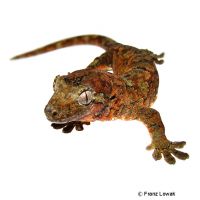Bavay's Giant Gecko (Mniarogekko chahoua)
| Bavay's Giant Gecko Mniarogekko chahoua | |
|---|---|
| Name | Bavay's Giant Gecko |
| Name Lat. | Mniarogekko chahoua |
| Synonym | Rhacodactylus chahoua |
| Family | Diplodactylid Geckos |
| Family lat. | Diplodactylidae |
| Order | Scaled Reptiles |
| Order lat. | Squamata |
| Origin | New Caledonia |
| Habitat | Forests, shrubland |
| Diet | Insects, fruits |
| Humidity | 70-90 % |
| Behavior | Nocturnal, ♂ territorial |
| Keeping | Pair |
| Care Level | Difficult |
| Reproduction | Oviparous |
| Housing | Humid terrarium |
| Life Span | 15 years |
| Protection | No |
| Metric Units | |
| Size | 22-25 cm |
| Temperature | 25-28 °C |
| Temperature Local | 30-35 °C |
| Housing Size | 70 x 70 x 90 cm |
| US Units | |
| Size | 8.7"-9.8" |
| Temperature | 77-82 °F |
| Temperature Local | 86-95 °F |
| Housing Size | 30" x 30" x 35" |
Distribution and habitat
The nocturnal, arboreal lichen geckos occur exclusively (endemically) in New Caledonia, mainly in the south of Grande Terre and the offshore islands of Ile des Pins and Iles Belep. They live in deciduous and scrub forests up to 500 m altitude and prefer dense vegetation or tree hollows for shelter
Maintenance
Recommended minimum dimensions for the terrarium, according to the size and number of animals
| 1-2 animals | 6KRL x 6KRL x 8KRL (L x W x H) |
Head-torso length (KRL) is measured on the largest animal. For each additional animal, increase the footprint by 15%. A terrarium of e.g. 70 x 70 x 90 cm is recommended, which should be placed in a quiet and vibration-free place.
You need a terrarium with partly vertical climbing branches, roots and many plants, like Ficus, Scindapsus etc. (hiding and shady places), structured back and side walls (e.g. cork covering), a graveable substrate of forest soil-peat mixture and a water basin (waterfall). The substrate should always be kept slightly moist. Several times a day the inside of the terrarium should be finely sprayed with water (humidity), but a rain or mist system is better
| Temp. day: 25-28 °C | Temp. night: 22-26 °C | Temp. local: up to 30 °C | Humidity: 70-90 |
Thermostatically controlled floor heating is recommended. Lighting duration must be 12-14 hrs. Daylight fluorescent tubes are ideal. A special UV light is not necessary.
Diet
The food supply consists of live insects, such as crickets, house crickets, grasshoppers, cockroaches, zophobas and mealybug larvae, alternatively special ready-made food for geckos or insectivorous reptiles can be offered, supplemented with some fruit pulp and sweet fruits (e.g. bananas, papaya). Wax moths should rarely be fed in very small amounts due to their large fat content. Young animals should be offered food daily, adults 4-5 times a week. Regular addition of minerals and vitamins (dusting of feed) is important. Drinking water must always be available
A regular and varied diet promotes health and prevents deficiency symptoms.
Reproduction and breeding
The male has clearly visible hemipenis pockets
The female lays 2 soft-shelled eggs (4-6 clutches annually) in the moist substrate. The incubation period is 65-85 days at a temperature of 26-29 °C. Small insects such as fruit flies and micro crickets are suitable as initial food for the young.
Important
Their natural basic coloration ranges from brown to green to red with gray or white lichen markings
With their lamellar toes (adhesive toes) they can also climb on smooth, vertical surfaces (e.g. glass). They must not be held by the tail, which serves as an additional grasping organ (adhesive scales) and can be thrown off in case of danger. However, usually no complete regenerate is formed.
For the resting phase, the lighting duration is shortened by 2-3 hours for approx. two months and the temperature is lowered by 3-4 °C
With fruit and honey water as food for the feeders, their quality can be upgraded.
The terrarium must have good ventilation without drafts and meet the species specific needs. Measuring devices such as thermometers, hygrometers, etc. are necessary. The lighting has to correspond to the species-specific day-night rhythm and has to be placed in such a way that the animals cannot injure themselves. The terrarium should be locked in such a way that neither unauthorized persons can open it nor the animals can escape. Contamination must be removed regularly.
Further literature can be found in your pet store.
References
Text: petdata; Image: Franz Lowak
Source: BMELV (1997): Tierschutzgutachten - Mindestanforderungen an die Haltung von Reptilien
ENGELMANN (2006): Zootierhaltung - Tiere in menschlicher Obhut: Reptilien und Amphibien, Harri Deutsch Verlag
- Gemäß § 21 Abs. 5 Tierschutzgesetz idgF
